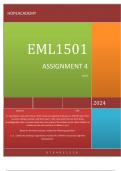HOPEACADEMY
EML1501
ASSIGNMENT 4
2024
2024
Question [40]
1.1 Learning to read and write are both social and cognitive endeavours. Children learn from
parents, siblings, teachers and their peers. They copy what they see from these
knowledgeable others and also make their own sense of the written words. Allow children to
scribble around and read their scribbles to you.
Based on the above excerpt, answer the following questions:
1.1a. Justify why reading is regarded as essential for children’s social and cognitive
development.
0 7 6 4 0 3 1 2 2 9
,EML1501 ASSIGNMENT 04
Essay-type questions
Question [40]
1.1 Learning to read and write are both social and cognitive endeavours. Children
learn from parents, siblings, teachers and their peers. They copy what they see
from these knowledgeable others and also make their own sense of the written
words. Allow children to scribble around and read their scribbles to you.
Based on the above excerpt, answer the following questions:
1.1a. Justify why reading is regarded as essential for children’s social and cognitive
development.
For children, reading is a vital skill that plays a crucial role in both social and
cognitive development (Vygotsky, 1978). On the social side, reading helps children
connect with others, build relationships, and understand different perspectives.
When children read, they gain insight into the thoughts, feelings, and experiences
of others, fostering empathy and social skills.
Cognitively, reading enhances children's ability to think, learn, and problem-solve.
It exposes them to new vocabulary, ideas, and concepts, expanding their
knowledge and understanding of the world (Piaget, 1963). Reading also improves
memory, concentration, and critical thinking skills, laying the foundation for
future academic success.
Moreover, reading is a social activity that involves interaction with others, such as
parents, teachers, and peers. Children learn from these knowledgeable others by
observing, imitating, and making sense of the written word (Vygotsky, 1978). By
, engaging with others through reading, children develop essential communication
skills, including listening, speaking, and writing.
In conclusion, reading is essential for children's social and cognitive development.
It helps them build relationships, understand different perspectives, and develop
critical thinking skills. By recognizing the importance of reading, parents and
educators can provide children with opportunities to engage with written
language, fostering a lifelong love of learning and social growth.
References:
- Piaget, J. (1952). The origins of intelligence in children. New York: International
Universities Press.
- Vygotsky, L. S. (1978). Mind in Society: The Development of Higher Psychological
Processes. Cambridge, MA: Harvard University Press.
1.1b. Demonstrate your understanding of why reading and writing are regarded
as inseparable components of literacy development.
Reading and writing are like two sides of the same coin - they go hand in hand and
are inseparable components of literacy development (Kress, 2000). When children
learn to read, they are also learning to write, and vice versa. Reading helps
children understand the meaning of written words, while writing enables them to
express their own thoughts and ideas.
Through reading, children develop an understanding of language structures,
vocabulary, and grammar, which are essential skills for writing (Smith, 1988). As
they read, they see how words are used to convey meaning, and this helps them
develop their own writing style. On the other hand, writing helps children practice
and reinforce their reading skills, as they learn to encode their thoughts and ideas
into written language.




